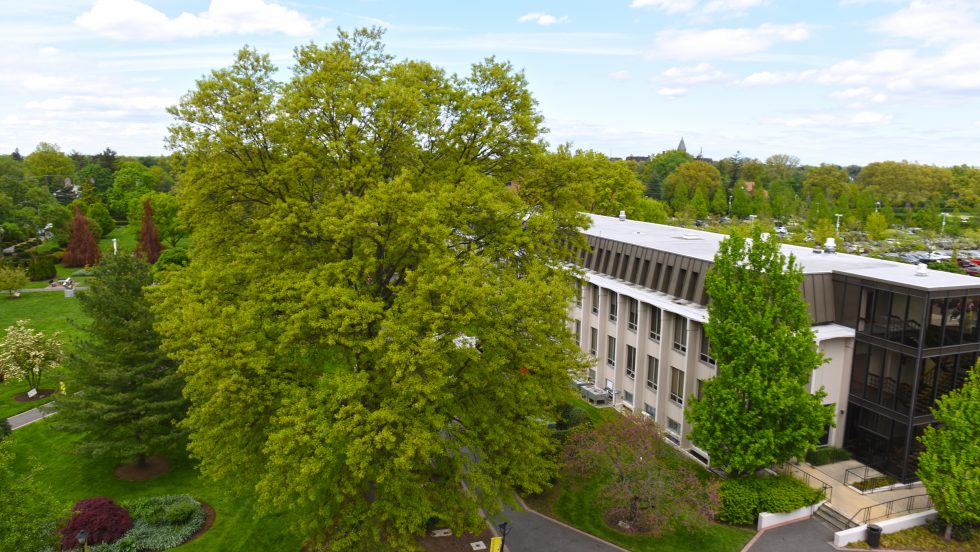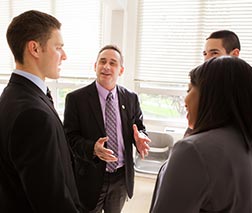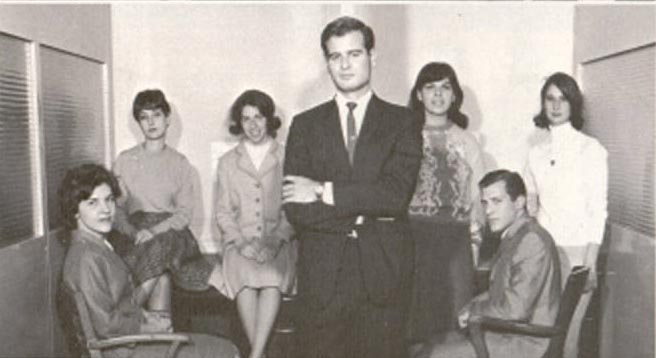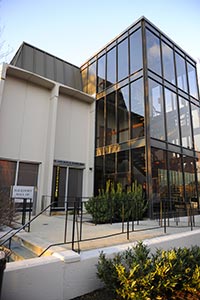
In 2014, the Robert B. Willumstad School of Business celebrates 50 years of providing innovative business education.
The Robert B. Willumstad School of Business spent 2014 and the former half of 2015 celebrating the 50-year anniversary of being chartered, during its 1964–1965 academic year, by the State of New York as a degree-granting school.
So what does every student want to know about an institution that’s been in business—officially and literally—for half a century? That’s easy. What’s next?
The answer, fittingly, was expressed by Adelphi’s fifth president, Arthur W. Brown (1965–1967), within the pages of the 1965 edition of Adelphi’s yearbook, Oracle.
“The truly educated man knows that we can hope to live significantly in the present only by continuously preparing for the future, but he also knows that such preparation cannot be made by denying the past,” he wrote.
Adelphi has been offering business degrees since 1934, but it wasn’t until 1965 that the School of Business Administration took form and began to gain substantial momentum.
To begin, the School’s undergraduate division offered programs in accounting and management leading to the Bachelor of Business Administration, while the graduate division offered curricula leading to a Master of Business Administration, Master of Business Administration with a CPA sequence and a Master of Science in Accounting.
College status under the umbrella of the newly minted Adelphi University also allowed for groundbreaking for the new Business Administration Building that would be completed in 1968 and which would retain its original name until 2003, when it was rededicated as the Hagedorn Hall of Enterprise.
It didn’t take long for the School to achieve national recognition for one of its programs, started in 1971. Adelphi-On-Wheels was the first commuting classroom. According to archived records, commuters throughout the greater New York metropolitan area could use their time on local railroads, in specially equipped cars, to take credit courses—the same as those given on campus—for the School’s MBA program.
The School was awarded $10,000 in 1979—about $31,000 in today’s currency—from the Academy for Educational Development for the program.
It’s reported that more than 1,000 students graduated from the program, with Joseph Marian credited as its first MBA graduate in 1972.
In June 1974, the School expanded by offering the Center of Banking and Money Management to its students, which aimed to provide a broad and basic understanding of significant banking and monetary problems.
Joining that program’s ranks the same year was another unique certificate program hot on the wheels of the commuting classroom— the Certificate Program in Management for Women. This program was initiated to fulfill the societal demand for the placement of women in administrative positions.
“Where are the promotable women?” one recruitment brochure asked.
The 24-credit-hour graduate level certificate combined some of the basic MBA courses with a field experience option and was considered a great success. It, too, would receive a $10,000 recognition award, this time in 1980 from the American Assembly of Collegiate Schools of Business—the same organization from which the School would receive accreditation for the first time in 2007, and which it still retains today. That organization uses the same acronym, AACSB, but is now the Association to Advance Collegiate Schools of Business.
Despite how things have changed, the foundation of the Willumstad School of Business still mirrors the academic goals and ambitions from 50 years ago.
A promotion flyer from 1960 describes the School’s objective as one that endeavors to provide thorough and comprehensive grounding in business fundamentals and problem analysis to allow for the intelligent and efficient direction of business firms, along with the understanding of essential fundamentals in which an appreciation for the social, economic and political environment—where business decisions must be made—is inherent.

Brian Rothschild, former assistant dean of the Robert B. Willumstad School of Business, speaks with students
Whether the School changed its name to the School of Business in 1999, or to the Willumstad School of Business in 2012—in honor of Mr. Willumstad’s $9.5 million contribution that same year— the objective and purpose of the School has never changed, and it never will, according to current Dean Anthony Libertella, Ph.D., J.D.
“Although our goals and ambitions may not have changed, our classrooms, methods of instructions and content are constantly being improved,” Assistant Dean Brian Rothschild said.
For Ganesh Pandit, associate dean, the students of today exhibit the same sincerity and integrity as did students 50 years ago.
In 2009, the School topped 17,000 alumni, including Thomas Donohue, president and CEO of the U.S. Chamber of Commerce, Al Trautwig, Madison Square Garden broadcaster, and Carmen Ortiz, U.S. attorney for the district of Massachusetts.
The objective is ongoing, but every year it has been given the checkmark of success. So what’s next? That’s also easy. The resounding answer from all faculty and staff is the same. “That’s up to you.”

